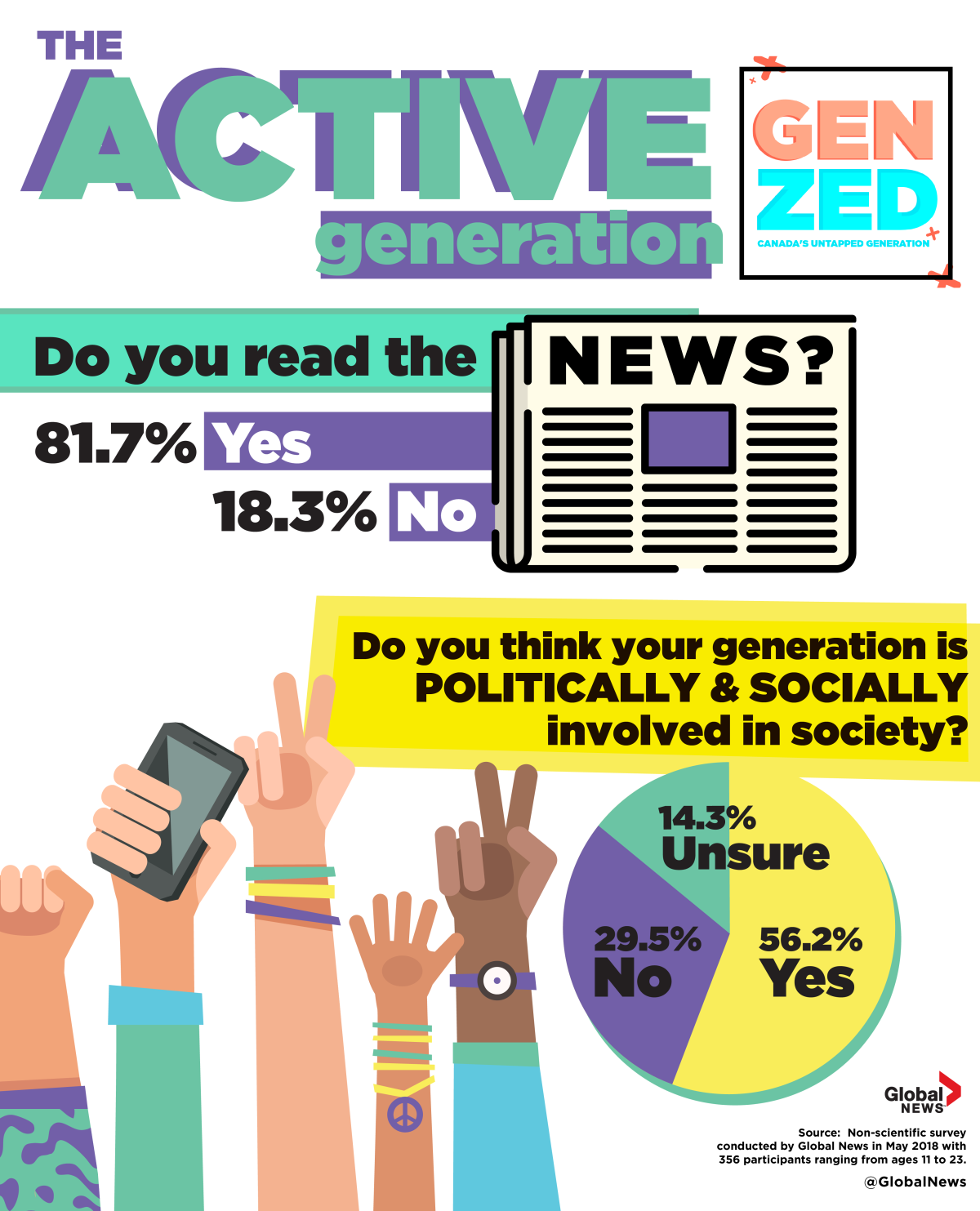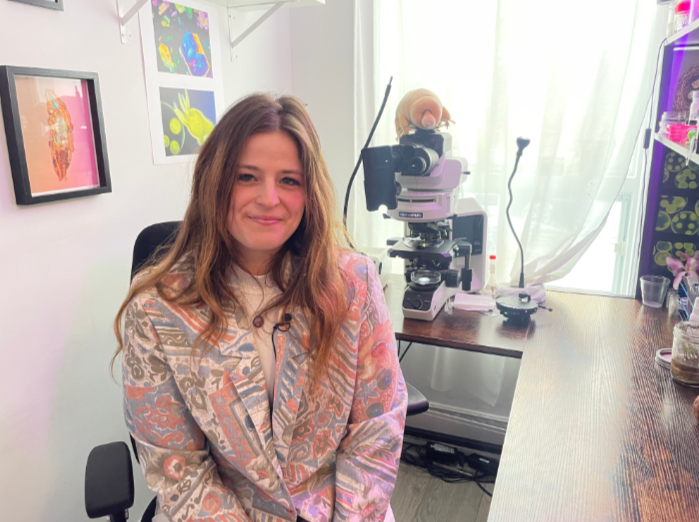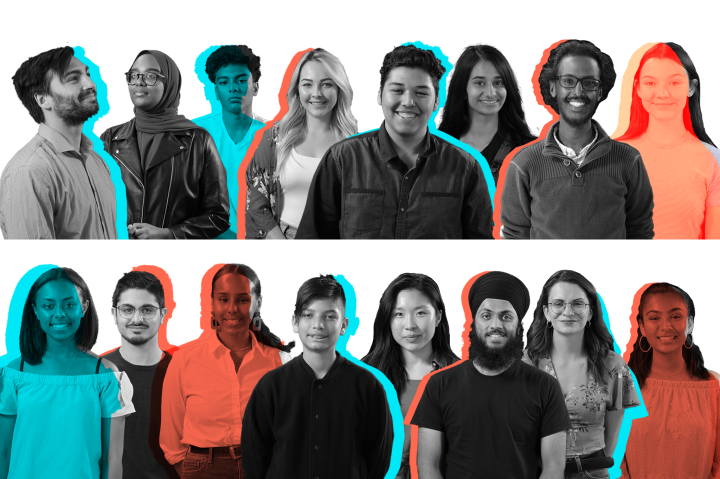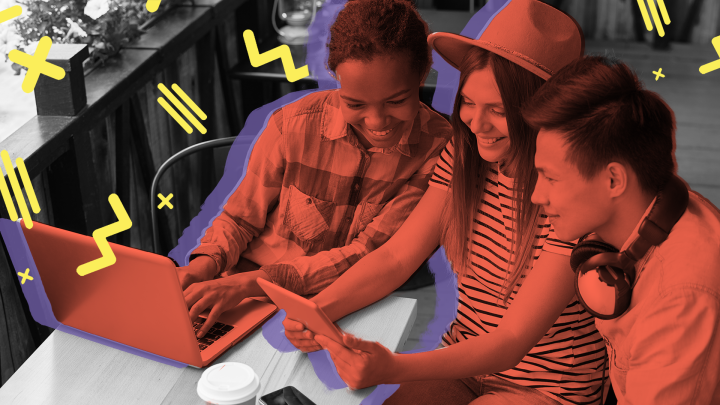
Seventeen people were fatally gunned down inside a school on Feb. 14.
Valentine’s Day.
Images of sobbing parents and trembling children were plastered over computer screens around the world.
A wave of hopelessness. Another U.S. school shooting.
And then came the uprising. Students who stood up and said, “never again.”
WATCH: Generation Z on social and political activism

The Parkland, Fla., teens took over social media, demanding gun reform from U.S. President Donald Trump. They took on the National Rifle Association, while also attending funerals for their friends.
Canadians their age were watching and inspired, too.
In a series of interviews with Global News, several members of generation Z highlighted the example of Parkland teens.
One 17-year-old from Toronto, Alice Cheng, says their success shows that location doesn’t matter — it’s all about raising your voice online.
“In recent months, we’ve seen school walkouts in the United States. That was a largely youth-led movement,” Cheng says.
READ MORE: Who is generation Z? Global News found out
Youth can change the world, and they have in the past.
Young people were instrumental in the Civil Rights Movement in the U.S., speaking out against segregation in schools, and taking part in Freedom Rides.
And across the world years later, much of the Arab Spring was kickstarted by youth taking to social media and planning protests.
READ MORE: U.S. teens share what they’ll miss with #IfIDieInASchoolShooting
There are countless examples in history of youth starting or leading movements. And this latest generation — generation Z — is no different.
Generation Z makes up roughly 17.6 per cent of Canada’s total population, according to 2017 data from Statistics Canada. Although there is no established start or end date, experts say gen Z-ers are born between 1995 and 2005, making the youngest 13 and the oldest 23. Some argue the generation ends at ages 22 (1996) or 24 (1994). This is still a growing population, one that may not have had traditional life experiences (jobs, mortgages, etc.) thrown at them. They are still optimistic for what the future holds — and truly believe they can change it.
Generation Z: Meet Canada’s connected and optimistic generation

Rebecca Raby, a child sociology professor at Ontario’s Brock University, explained there’s often an assumption that youth are uninterested in world issues.
“For a significant period of time, it’s been assumed that young people today are portrayed as more apathetic, unengaged, lacking drive or self-absorbed,” Raby told Global News.
But that’s not necessarily true, she says.
Raby notes that each generation of youth has been involved in social movements in their own right — but there have been “waves” of higher engagement.
“There are certain times when it gets more attention from popular media,” she says.
“Certain kinds of movements capture people’s imaginations more than other kinds, moments when large swaths of young people are involved.”
We’re in one right now because of Parkland, she says.
Much of that movement started online, with students like Emma Gonzalez tweeting at politicians and gun rights activists to create change.
Students even managed to organize a cross-country school walkout by spreading the word on the web.
READ MORE: Generation Z is waiting — often months — to get mental health help
Raby says social media, and how tech savvy generation Z is, has changed the way activism plays out.
“I think it’s been a really powerful tool for young people to get their voice out. It’s unmediated, they don’t have to depend on whether a large newspaper or broadcaster picks up their story.”
The professor added that youth can also more easily communicate with each other through social media.
“They can create their story,” she says.
North of the border, generation Z is involved, too.
A non-scientific survey of 356 self-proclaimed gen-Zers conducted by Global News found that nearly 82 per cent regularly read the news.
In addition, 56 per cent describe themselves as “very aware and active” in matters related to politics and social movements.
Striving for equality in society was the issue they cared most about at 44 per cent, followed by poverty (13 per cent) and international issues at 15 per cent.
With all that said, many respondents to Global News’ survey noted there’s an assumption generation Z is lazy.
It’s a bias many are working to change. Case in point is Apefa Adjivon.
The 19-year-old, originally from Calgary, began studying at the University of Toronto in hopes of one day becoming a human rights lawyer.
Since moving to Toronto, she’s found herself involved in numerous initiatives — she’s part of the university’s Black Students’ Association, is the equity co-chair on the student government, and the founder of Pearl Project, an organization that works to empower girls in low-income communities to achieve their dreams through mentorship, tutoring and social activities.
It’s an idea that Adjivon says is close to her heart as a black woman, whose mom was a refugee from Sierra Leone.
Growing up, Adjivon constantly heard that women should stay at home, while most of her female relatives didn’t attend school.
She learned through conversations with other young black women that her experience wasn’t unique.
READ MORE: Generation Z isn’t interested in dating or sex — or so we thought
That’s why she took matters into her own hands.
Pearl Project continues to gain more momentum, but she doesn’t want to stop just there.
Adjivon explains she wants to focus her career on giving young people a voice, so they too can create change.
“The change I am always looking to make is to bring the voices of marginalized youth to the table.”
Empowering women is something Kiran Kumar is also passionate about.
The 15-year-old from Burlington, Ont. is the founder of the Canadian chapter of charity CrossBow Miles, which works to make India a safer place for women and girls.
Kumar told Global News that the idea to get involved was sparked by a dinner table conversation.
READ MORE: Don’t know how to break your phone addiction? Just ask generation Z
“I always knew that what happened in India was unjust. It never hit me,” Kumar says.
“I never really appreciated a woman’s ability. However, there was a trigger which made me an official feminist.”
From then, Kumar began fundraising for CrossBow Miles, making hundreds of calls asking for donations and even selling samosas in the foyer of her high school. She had so much success that her school’s cafeteria sales plummeted — and CrossBow Miles made her the head of its Canadian chapter.
The student now often works 14 to 16 hours a day, but says she’s still in a “good mood” at the end.
“The work I’m doing is so rewarding, so enjoyable, so aligned with my interests, and all my choice,” she says.
Difficulties youth face
While Adjivon and Kumar are involved in activism, not all youth are.
That doesn’t necessarily mean her generation doesn’t care, though, it just means that getting involved is hard.
WATCH: Who is Generation Z? Farah Nasser sat down with national online journalist Arti Patel to talk about this cohort of young people

“We are very aware of the issues our communities, societies, and the world faces but there aren’t a lot of opportunities for us to do something about it,” Adjivon says.
She explained that governments, community organizations and charities need to do more outreach to youth.
“Being involved comes at a cost,” she adds, explaining that youth are often in school, work multiple jobs and have other commitments.
Volunteer work or activism is time-consuming and often doesn’t pay.
Raby adds that youth have the added challenge of proving to adults that their beliefs and values are important — or simply that they know what they are doing.
READ MORE: Parkland students are protesting the mandatory clear backpacks
“The other thing that really undermines that activism of young people are the attitudes of adults,” she says, explaining that they are often ignored as not understanding the issue, or that they are being manipulated by a third party.
But Adjivon advises youth who want to get involved to be more proactive, if the opportunities aren’t seeking you — you should seek them.
“Just be brave enough to send someone a message,” she says. “Reach out to someone, even if it’s just for a coffee.”
This week, Global News will take a look at the many ways gen Z functions, from their views on mental health and the job market to how they take part in pop culture. As you’ll see, this is still a largely untapped generation. Follow along on Twitter with the hashtag #GenZed.
— Illustrations by Laura Whelan




















Comments
Want to discuss? Please read our Commenting Policy first.